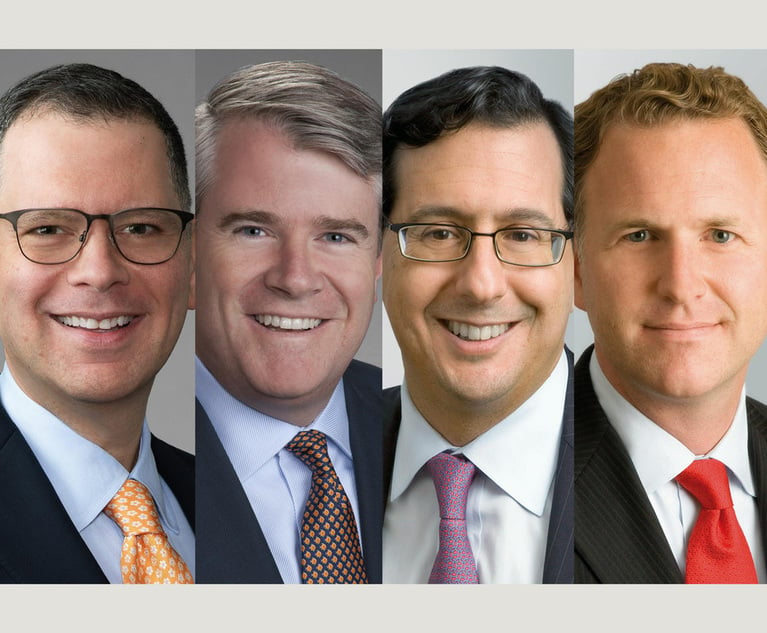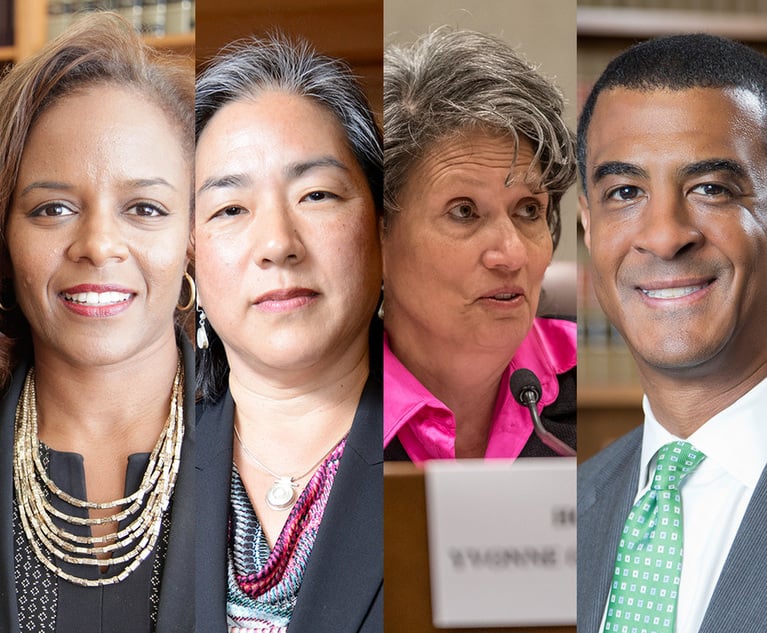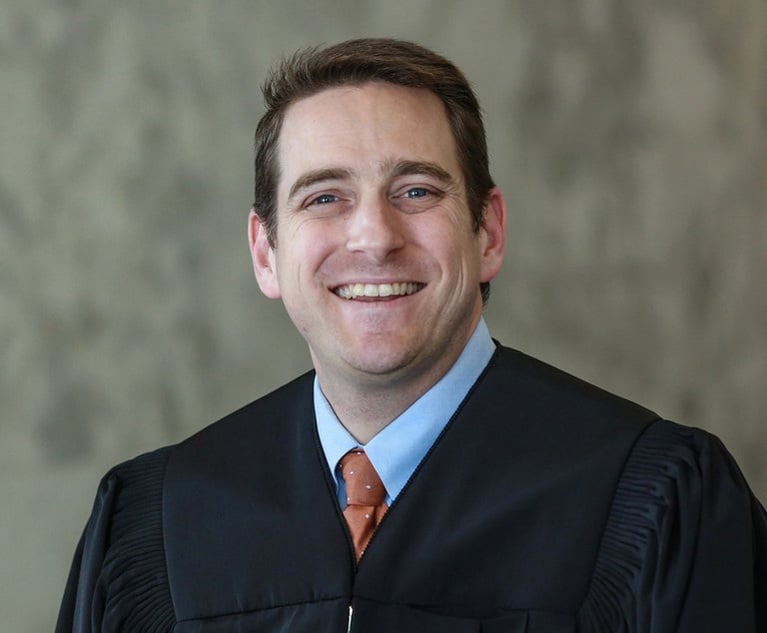Litigator of the Week Runners-Up and Shout Outs
Latham's rare trial win fending off a "holder's" claim for client NextGen Healthcare Inc. leads this week's runners-up.
August 06, 2021 at 07:25 AM
5 minute read
In a once-in-a-generation securities trial, a team at Latham & Watkins brought home a defense verdict for client NextGen Healthcare Inc. in state court in Orange, County, California. The Latham team, led by Michele Johnson, the global chair of the firm's litigation and trial department and partner Peter Wald, nabbed top runners-up honors this week for fending off a rare "holder's" claim from former company board member Ahmed Hussein. Hussein claimed he would have sold off shares prior to financial restatement by the company had executives not misled him. He was seeking $400 million in damages. However, Hussein, who had engaged in a number of proxy fights seeking to take control of the company's board in prior years, couldn't convince jurors that statements by company executives had convinced him to hold onto the shares when he otherwise could have sold them. The Latham trial team included partners Nicholas Siciliano and Andrew Gray and associates Whitney Weber and Katie George.
The folks at Gibson, Dunn & Crutcher landed a bevy of runner-up-worthy results this week. First up, a team led by Ted Boutrous, Sam Liversidge and Chris Dusseault got an important decision from the Fourth Circuit digging into the numerosity prong of class certification. The appellate court vacated and remanded a previously certified class of 35 large drug wholesalers pursuing antitrust claims against Merck based on allegations the company conspired with generic company Glenmark to inflate the price of a cholesterol-lowering drug. The court concluded: "Because the district court's numerosity analysis improperly looked to the impracticability of individual suits rather than joinder, we are compelled to conclude that legal error infected the court's class-certification decision." Merck's codefendant Glenmark was represented by Steve Reed and Brendan Fee of Morgan, Lewis & Bockius.
Gibson Dunn partners Theane Evangelis and Blaine Evanson got a win for client Uber Technologies Inc. at the Ninth Circuit in the long-running legal brawl over claims Uber misclassified drivers as independent contractors. The appellate court held that drivers don't fall within an exemption to the Federal Arbitration Act reserved for workers who engage in "foreign or interstate commerce." Relying on trial court findings that only a small portion of Uber rides started and ended in different states or at an airport, the Ninth Circuit concluded that "interstate movement cannot be said to be a 'central part of the class members' job description.'"
This content has been archived. It is available through our partners, LexisNexis® and Bloomberg Law.
To view this content, please continue to their sites.
Not a Lexis Subscriber?
Subscribe Now
Not a Bloomberg Law Subscriber?
Subscribe Now
NOT FOR REPRINT
© 2025 ALM Global, LLC, All Rights Reserved. Request academic re-use from www.copyright.com. All other uses, submit a request to [email protected]. For more information visit Asset & Logo Licensing.
You Might Like
View All
Litigators of the Week: US Soccer and MLS Fend Off Claims They Conspired to Scuttle Rival League’s Prospect

‘Listen, Listen, Listen’: Some Practice Tips From Judges in the Oakland Federal Courthouse
Law Firms Mentioned
Trending Stories
- 1States Accuse Trump of Thwarting Court's Funding Restoration Order
- 2Microsoft Becomes Latest Tech Company to Face Claims of Stealing Marketing Commissions From Influencers
- 3Coral Gables Attorney Busted for Stalking Lawyer
- 4Trump's DOJ Delays Releasing Jan. 6 FBI Agents List Under Consent Order
- 5Securities Report Says That 2024 Settlements Passed a Total of $5.2B
Who Got The Work
J. Brugh Lower of Gibbons has entered an appearance for industrial equipment supplier Devco Corporation in a pending trademark infringement lawsuit. The suit, accusing the defendant of selling knock-off Graco products, was filed Dec. 18 in New Jersey District Court by Rivkin Radler on behalf of Graco Inc. and Graco Minnesota. The case, assigned to U.S. District Judge Zahid N. Quraishi, is 3:24-cv-11294, Graco Inc. et al v. Devco Corporation.
Who Got The Work
Rebecca Maller-Stein and Kent A. Yalowitz of Arnold & Porter Kaye Scholer have entered their appearances for Hanaco Venture Capital and its executives, Lior Prosor and David Frankel, in a pending securities lawsuit. The action, filed on Dec. 24 in New York Southern District Court by Zell, Aron & Co. on behalf of Goldeneye Advisors, accuses the defendants of negligently and fraudulently managing the plaintiff's $1 million investment. The case, assigned to U.S. District Judge Vernon S. Broderick, is 1:24-cv-09918, Goldeneye Advisors, LLC v. Hanaco Venture Capital, Ltd. et al.
Who Got The Work
Attorneys from A&O Shearman has stepped in as defense counsel for Toronto-Dominion Bank and other defendants in a pending securities class action. The suit, filed Dec. 11 in New York Southern District Court by Bleichmar Fonti & Auld, accuses the defendants of concealing the bank's 'pervasive' deficiencies in regards to its compliance with the Bank Secrecy Act and the quality of its anti-money laundering controls. The case, assigned to U.S. District Judge Arun Subramanian, is 1:24-cv-09445, Gonzalez v. The Toronto-Dominion Bank et al.
Who Got The Work
Crown Castle International, a Pennsylvania company providing shared communications infrastructure, has turned to Luke D. Wolf of Gordon Rees Scully Mansukhani to fend off a pending breach-of-contract lawsuit. The court action, filed Nov. 25 in Michigan Eastern District Court by Hooper Hathaway PC on behalf of The Town Residences LLC, accuses Crown Castle of failing to transfer approximately $30,000 in utility payments from T-Mobile in breach of a roof-top lease and assignment agreement. The case, assigned to U.S. District Judge Susan K. Declercq, is 2:24-cv-13131, The Town Residences LLC v. T-Mobile US, Inc. et al.
Who Got The Work
Wilfred P. Coronato and Daniel M. Schwartz of McCarter & English have stepped in as defense counsel to Electrolux Home Products Inc. in a pending product liability lawsuit. The court action, filed Nov. 26 in New York Eastern District Court by Poulos Lopiccolo PC and Nagel Rice LLP on behalf of David Stern, alleges that the defendant's refrigerators’ drawers and shelving repeatedly break and fall apart within months after purchase. The case, assigned to U.S. District Judge Joan M. Azrack, is 2:24-cv-08204, Stern v. Electrolux Home Products, Inc.
Featured Firms
Law Offices of Gary Martin Hays & Associates, P.C.
(470) 294-1674
Law Offices of Mark E. Salomone
(857) 444-6468
Smith & Hassler
(713) 739-1250








